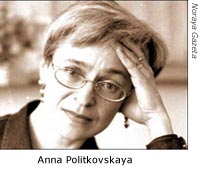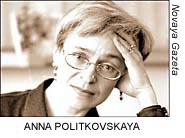
CPJ condemns slaying of Russian reporter Anna Politkovskaya
New York, October 7, 2006—The Committee to Protect Journalists condemns today’s murder of Anna Politkovskaya, a Russian journalist renowned for her critical coverage of the Chechen conflict. Politkovskaya was found shot to death in the elevator of her apartment building in Moscow, The Associated Press reported.
Independent weekly newspaper’s offices searched
JULY 14, 2006 Posted: August 16, 2006 Orlovskye Novosti HARASSED Police searched the offices of the independent weekly newspaper Orlovskiye Novosti in the western Russian city of Oryol. Five police officers, accompanied by two officials from the local Office of Taxation, stated that the newspaper had failed to pay taxes. “The chief editor, Andrei Kanatnikov,…
CPJ condemns draft law to silence government criticism
New York, December 7, 2005—The Committee to Protect Journalists is alarmed by draft legislation that makes criticism of authoritarian President Aleksandr Lukashenko and his government punishable by up to five years in prison. The lower house of parliament passed amendments to the Penal Code on December 2, a move criticized by the United States and…
Attacks on the Press 2004: Russia
RussiaA midyear purge of independent voices on state television and an alarming suppression of news coverage during the Beslan hostage crisis marked a year in which Russian President Vladimir Putin increasingly exerted Soviet-style control over the media. Using intelligence agents and an array of politicized state agencies, Putin pushed for an obedient and patriotic press…
Independent coverage obstructed in Beslan; detentions, harassment reported
New York, September 7, 2004— Independent media coverage of last week’s hostage crisis in Beslan, Russia, was obstructed several times by detentions or harassment, the Committee to Protect Journalists has found. Thirty to 40 heavily armed fighters, allegedly of Chechen, Ingush and North Ossetian origin, took more than 1,000 children, parents and teachers hostage on…

Another journalist detained at Moscow airport
New York, September 2, 2004—The Committee to Protect Journalists is alarmed by reports that prominent Russian journalist Anna Politkovskaya was poisoned last night en route to Beslan, North Ossetia, where about 40 heavily armed fighters, reportedly of Chechen and Ingush origin, seized hostages at an elementary school yesterday.
Attacks on the Press 2003: Europe and Central Asia Analysis
While integration into NATO and the European Union has had a positive effect on press freedom conditions in most of Central Europe and the Baltic states, the situation for journalists in Russia and the former Soviet republics has worsened steadily, with governments relying on authoritarian tactics to silence the media. Even reformist governments in the…
Attacks on the Press 2003: Belarus
Squeezed by the expansion of NATO and the European Union to the west and tepid relations with Russia to the east, Belarus grew ever more isolated. In the face of that isolation, President Aleksandr Lukashenko continued his assault on the media in 2003, tightening his grip on the impoverished country. Local analysts suspect that Lukashenko’s…
Attacks on the Press 2003: Russia
Russian president Vladimir Putin and his coterie of former intelligence officials pressed ahead in 2003 with his vision of a “dictatorship of the law” in Russia to create a “managed democracy.” Putin’s goal of an obedient and patriotic press meant that the Kremlin continued using various branches of the politicized state bureaucracy to rein in…
Journalists Killed in Russia 2000-2003
Vladimir Yatsina, ITAR-TASS, February 20, 2000, Chechnya Yatsina, a photographer with the Russian news agency ITAR-TASS, was killed in Chechnya by Chechen militants who had taken him hostage. Two former hostages, Alisher Orazaliyev from Kazakhstan, and Kirill Perchenko from Moscow, reported the killing in statements recorded by Amnesty International after their release at the end…